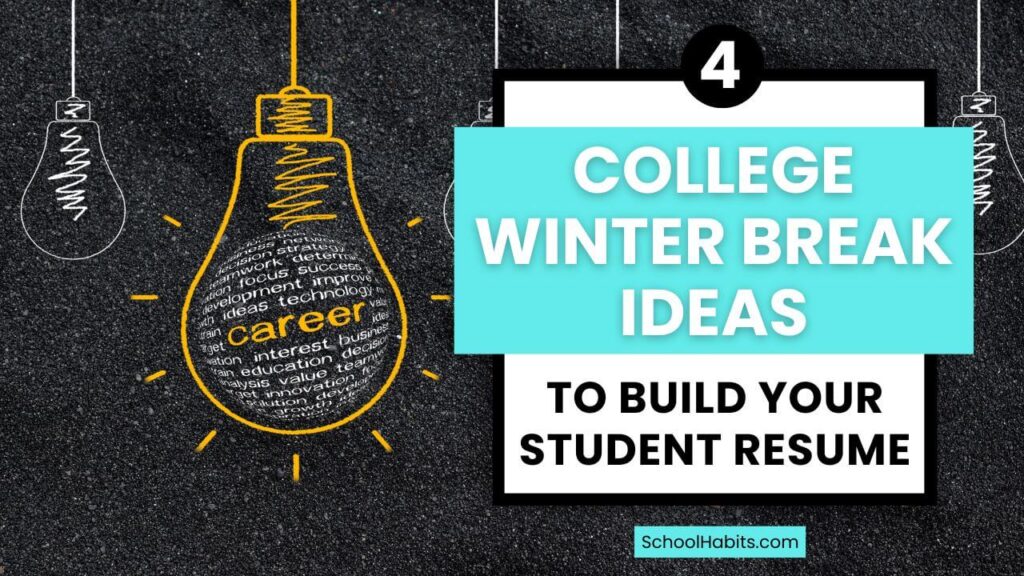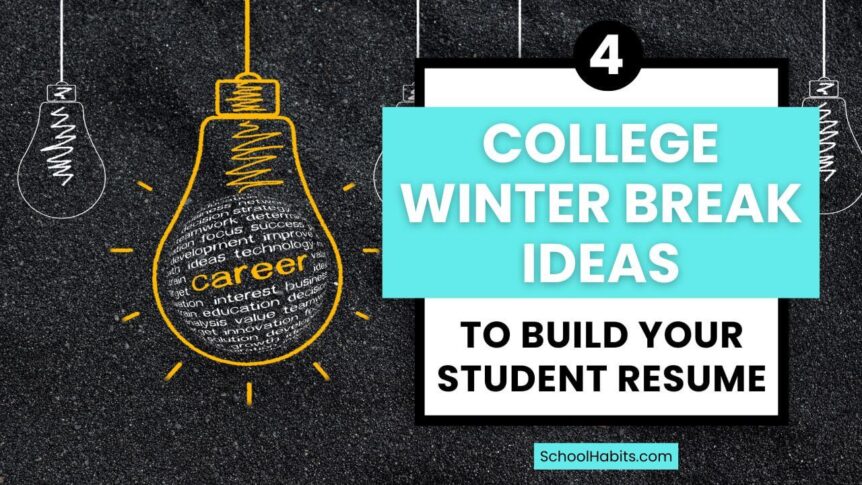
By Katie Azevedo, M.Ed.
Most colleges and universities have an extended winter break between the first and second semesters. While this winter break is a much-needed reprieve from your college classes, you can use this time to get involved in activities that build your skills, experience, and ultimately your student resume.
Why would you use your college winter break to do that? Because skills and experience are two of the top factors that will set you apart from your competition after graduation.
In this blog post, I’m sharing four college winter break ideas to build your student resume. You don’t have to do all four — but I would at least let these ideas inspire you to find something to do over winter break that your future self will thank you for.
College Winter Break Ideas to Build Your Student Resume
If you’re new to the concept of a student resume or don’t yet have one, definitely listen to this podcast episode: Resume Tips for Students: How to Build a Student Resume That Sets You Apart. In this episode, I walk you step-by-step through the 5 core sections every student resume must have.
1. Work a Job
This is the most obvious college winter break activity on the list. Working a job (even just part-time) is an excellent way to earn some money while also building up the employment section of your student resume.
If you regularly work a job over the summer, you may be able to return to that place of employment for some temporary work over winter break. This is usually the easiest option for students who already have a job connection.
Reach out to your previous employer early to express interest and confirm their availability. Employers often appreciate the help during the busy holiday season, so it’s worth checking — even if the position isn’t typically seasonal.
If you don’t have any prior place of employment to return to, you’ll want to begin looking for job opportunities a few weeks before your semester ends. Start by searching online, visiting local businesses, or leveraging your personal network to find short-term work opportunities.
Keep in mind that retail, customer service, and hospitality businesses often need extra help during the holidays.
Even if the job you take isn’t directly related to your future career goals, it’s still valuable. You’ll gain transferable skills like time management, communication, and teamwork, all of which are highly valued by employers.
Plus, having any job experience on your resume shows you’re reliable, responsible, and willing to put in the effort. These qualities make a strong impression on future hiring managers.
Remember, winter break is short, so if a traditional job isn’t available or doesn’t fit your schedule, consider gig work or freelance opportunities instead. Apps and platforms for delivery driving, tutoring, or creative freelancing can offer flexible, short-term options that are ideal for college students.
Or, as an alternative to a job, consider getting an internship – either paid or unpaid. Internships can be just as valuable, or even more so, than paid work experiences.
2. Complete a Short Online Course or Certification
Before you protest — yes, students do this. How do I know? Because I work with students who do this.
The winter break between first and second semester can be a great time to develop a skill or earn a certification relevant to your field of study. Platforms like Coursera, LinkedIn Learning, or SkillShare offer courses in areas like coding, project management, graphic design, and data analysis. A few weeks of focused learning can provide you with a concrete addition to your resume and talking points for future interviews.
An alternative to online learning platforms like those I listed is to take a course through your college or institution. Many schools offer concentrated (and abbreviated) courses during winter break – both for students who remain on campus and those who prefer an online course. Check with your academic advisor early, because these courses do fill up.
3. Shadow a Professional in Your Field of Interest
A hugely valuable use of your college winter break is to gain insight and experience by shadowing a professional in your field of interest.
Reach out to someone working in a career you’re interested in and ask if you can spend a few days shadowing them over the break. Whether it’s a local business owner, a professional at a company near home, or someone in your personal network, shadowing gives you firsthand insight into their daily responsibilities and the industry you’re curious about.
Even if you’re not entirely sure what your future career is going to be, shadowing someone in a related career can be invaluable.
For example, if you’re a business major but don’t know what field of business you’re specifically interested in, shadowing a professional in any business will show you the general ins and outs of how businesses are run.
Shadowing is also a great way to build connections and even secure future internships or job referrals.
While you can often find job postings online, you will not find postings for shadowing experiences; these you will have to create for yourself by reaching out to people you’re interested in learning from.
To make this process easier for you, I’ve created an email template that you can use to inquire about shadowing experiences.
Subject Line: Interested in shadowing you over winter break
Dear [Name],
My name is [Your Name], and I’m a [Your Year, e.g., sophomore] studying [Your Major] at [Your College].
I’m interested in learning more about [industry/role, e.g., marketing, engineering, nonprofit management] and noticed your impressive experience in [specific detail about their role or company, e.g., leading [Company]’s outreach team].
I’ll be home for winter break from [start date] to [end date], and I was wondering if I might be able to shadow you for a day or two during that time.
I’d love the opportunity to observe your work and gain a better understanding of what it takes to succeed in your field.
I’d be happy to work around your schedule and can make myself available at your convenience. Please let me know if this would be possible or if there’s someone else you might recommend I contact.
Thank you so much for considering my request. I appreciate your time and look forward to hearing from you!
Sincerely,
[Your Full Name]
[Your Contact Information, e.g., phone number or email address]
4. Go on an Adventure
Skill building doesn’t only happen in jobs or internships. It happens in any context, as long as you’re intentional about learning from what you’re doing.
With that said, your college winter break could be a great time to seek some kind of adventure experience that you’ve never encountered before. Maybe you go on a trip, maybe you take a road trip by yourself – the possibilities are endless.
Many colleges and universities run adventure programs through the school over winter break, so that’s a place to start your search. This can also be a more cost-effective approach, as the programs are designed for students on a budget.
When I was in college, I stayed on campus for one of my winter breaks and went on a dog-sledding expedition far up near the Maine/Canada border. We overnighted on the tundra and had with us only what we could carry in our dog sleds.
How did this dog-sledding experience help me build my resume? First, it made for an incredible talking point in future interviews. Second, it provided evidence of the skills I asserted I had on my resume: collaboration, perseverance, calculated risk-taking and critical thinking. And of course, it showed I had grit, which is a highly sought-after professional skill.
Final Notes About Building Your Student Resume Over Your College Winter Break
Winter break is a perfect opportunity to invest in yourself and your future. Whether you decide to work a job, secure an internship, take a course, shadow a professional, or go on an adventure, these activities can help you build skills, make connections, and add meaningful experiences to your student resume.
You don’t have to do it all. Just choose one college winter break idea that excites you and aligns with your academic or career goals. All experiences – big and small – can have a positive impact on your future opportunities. And of course, all experiences give you talking points at future interviews.
If you’re looking for more ideas and inspiration, check out these resources:
- Podcast Episode: Resume Tips for Students: How to Build a Student Resume That Sets You Apart
- Blog Post: How to Boost Your Resume Over the Summer (still relevant for winter break!)
- Blog Post: 15 Tips for Balancing School and a Job as a Student

